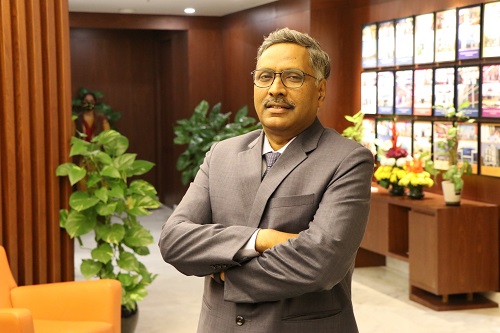When the Software Technology Parks of India (STPI) began its journey in 1991, India was a country in need of a significant transformation in the IT sector. The nation’s tech landscape was nascent, with software exporters facing numerous challenges, including a lack of necessary computing infrastructure, internet connectivity, and regulatory support. To bolster the growth of software exports and provide the essential services needed by budding IT firms, STPI was established under the Department of Electronics, Government of India.
 |
Shri Arvind Kumar, Director General, Software Technology Parks of India
In its early days, STPI focused on providing infrastructure and statutory services crucial for the fledgling industry. STPI setup its centres with the provision of ready-to-use office spaces, data communication services, and access to mainframes, which were rare and expensive resources at the time. These centres became hubs for IT activities, offering companies the facilities they needed to develop and export software without the burden of heavy initial investments. By acting as a single-window service provider, STPI streamlined the administrative processes, offering incentives and simplifying the regulatory framework, thus creating a conducive environment for growth.
As the 1990s progressed, the demand for robust data communication services grew. STPI responded by establishing high-speed data communication links through satellite and later, terrestrial fiber optic networks. This development was a game-changer, enabling Indian tech firms to seamlessly connect with clients across the globe. STPI’s efforts in providing reliable and high-speed internet facilities were instrumental at a time when such resources were scarcely available in India, positioning the country as a viable destination for software outsourcing and offshoring.
Through the late 1990s and early 2000s, the IT industry in India began to flourish. The Y2K bug and the dot-com boom presented unprecedented opportunities for Indian software companies. STPI played a pivotal role during this period, providing the necessary support and infrastructure to help Indian firms capitalize on these global opportunities. STPI’s centres in cities like Bangalore, Hyderabad, Pune, and Chennai became the epicentres of IT development, nurturing companies that had the potential to become global leaders.
STPI’s strong Pan-India presence of 65 centres, ensured that support for the Indian IT Industry was not confined to metropolitan cities. By setting up 57 incubation centres in Tier II and Tier III cities, STPI democratized access to resources and opportunities, enabling talent from across the country to contribute to India’s tech growth. These efforts were crucial in fostering a more inclusive growth of the country, where innovations could emerge from any part of the country. Due to these concerted efforts by STPI, today the IT-ITES Industry has reached to $254 Billion and also employs 5.43 Million youth in the country.
As India moves up the value chain in the global tech industry, STPI’s role continues to evolve. The organization is not just a provider of infrastructure but a catalyst for innovation and growth. By fostering a culture of entrepreneurship, promoting research and development, and facilitating collaborations with various stakeholders, STPI is ensuring that Indian tech firms remain competitive in an increasingly digital world.
In recent years, STPI has intensified its efforts to position India as a leader in the tech startup ecosystem. With this aim STPI has evolved a collaborative model through which 24 Centres of Entrepreneurship (CoEs) have been established in emerging technologies across the country, each dedicated to specific technological domains. These CoEs provide startups with access to state-of-the-art infrastructure, industry mentorship, and networking opportunities, and access to funding, thus driving innovation and entrepreneurship. This is further augmented by Next Generation Incubation Scheme (NGIS), a future-ready initiative, which was geared towards unleashing the vast untapped potential present in India’s Tier-2 and Tier-3 cities. The initiative focused on providing opportunities in these cities by building tailored support for high-potential tech startups, and ensuring they have the resources and guidance needed to succeed. Today, NGIS has provided stellar results operating across 12 Tier-2 locations in India, which include Agartala, Bhilai, Bhopal, Bhubaneshwar, Dehradun, Guwahati, Jaipur, Lucknow, Prayagraj, Mohali, Patna and Vijayawada. Through their holistic ecosystem, STPI has supported over 1000 startups in cutting-edge tech domains, which have created over 1714 new innovations and products, as well as over 500 intellectual property rights filings.
Looking ahead, STPI aims to build on its three-decade-long legacy of nurturing the IT industry. The organization’s future impact and goals are aligned with the vision of making India a leader in technology and innovation. STPI plans to expand its network of CoEs, focusing on emerging technologies and dispersal of the IT/ITeS Industry to Tier-II/III cities of the country for all-inclusive growth. By staying ahead of technological trends and anticipating the needs of the industry, STPI will continue to support the growth and development of Indian tech firms. STPI’s commitment to fostering a vibrant startup ecosystem remains unwavering. The organization will continue to provide mentorship, funding, skilling and market access to startups, ensuring they have the support needed to scale and succeed globally.
STPI’s efforts will be instrumental in driving the next wave of tech innovation in India, creating employment opportunities, and contributing to the country’s economic growth. The journey of the Software Technology Parks of India over the past three decades is a testament to its pivotal role in transforming India into an IT superpower. From providing basic infrastructure and connectivity in its early days to fostering innovation and supporting the next generation of tech startups, STPI has been at the forefront of India’s tech revolution. As the organization continues to evolve and adapt to the changing needs of the industry, it will undoubtedly play a crucial role in shaping the future of technology in India, ensuring the country remains a global leader in the digital age.
Shri Arvind Kumar
Director General
Software Technology Parks of India
![]()



